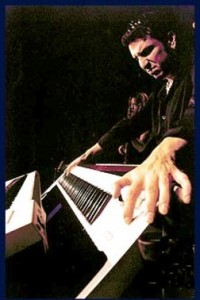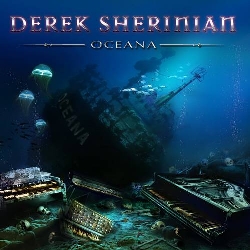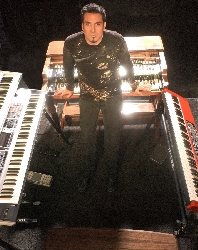
 To say that Derek Sherinian is a musical outlier would be an understatement. Most keyboard players are either jazz-focused or members of goofy hair metal bands. Sherinian is neither, although he dabbles in bits of both. Here’s a guy who loves rock-jazz fusion (with emphasis on the former, straying into the latter sonically on occasion, and time-signature-wise very frequently) and, at the same time, has played keys for the likes of both KISS and Alice Cooper. He’s probably most recognized, though, for his involvement in progressive rock and metal; whether we’re talking about his own band Planet X, his previous membership in Dream Theater, or the prog supergroup Platypus, his name is very recognizable in the progressive rock circuit. Currently, he is a full-time member of the rock supergroup Black Country Communion (with Glenn Hughes, Joe Bonamassa, and Jason Bonham), which is not progressive rock. It’s a strange gamut to run, but it’s something with which Derek seems completely comfortable…no pigeon-holing accepted here, thank you very much.
To say that Derek Sherinian is a musical outlier would be an understatement. Most keyboard players are either jazz-focused or members of goofy hair metal bands. Sherinian is neither, although he dabbles in bits of both. Here’s a guy who loves rock-jazz fusion (with emphasis on the former, straying into the latter sonically on occasion, and time-signature-wise very frequently) and, at the same time, has played keys for the likes of both KISS and Alice Cooper. He’s probably most recognized, though, for his involvement in progressive rock and metal; whether we’re talking about his own band Planet X, his previous membership in Dream Theater, or the prog supergroup Platypus, his name is very recognizable in the progressive rock circuit. Currently, he is a full-time member of the rock supergroup Black Country Communion (with Glenn Hughes, Joe Bonamassa, and Jason Bonham), which is not progressive rock. It’s a strange gamut to run, but it’s something with which Derek seems completely comfortable…no pigeon-holing accepted here, thank you very much.
With that very short summary of his other musical involvement, we come to his solo efforts. They most certainly all fall under the very wide title of “progressive,” but each album has its own identity. Some owe their sound more to the rock-jazz fusion that Sherinian so loves (a la Mahavishnu Orchestra, Jing Chi, or the Dixie Dregs), and others have metal leanings. All include a nice slice of who’s-who-in-the-world-of-guitar, and songs are well-tailored to the guitarists that are featured, whether it’s Yngwie Malmsteen and Zakk Wylde or Al Di Meola and John Petrucci. Because of his aggressive keyboard style (the Korg patch called “Monster Lead” was made popular by Sherinian), the guitars never seem to be in competition with the keyboards…unless Derek is going for a dueling solo feel, and then, well, brace yourself, because this guy has fingers as fast as any guitarist with whom he plays.
 So, that brings us to his latest offering, Oceana. I have to admit that I was a bit leery when I placed my order for this disc (yes, I still buy CDs, because I am a sound quality snob). You see, in my opinion, the last couple of solo offerings, while still pretty good, ended up being very guitar-heavy-metal-wankfests (and most critics, other than the ever-increasingly-irrelevant All Music Guide agree with me on this one). This is most likely because they both feature a lot of Yngwie Malmsteen and Zakk Wylde. Don’t get me wrong, I really dig both of those guys (and have seen each of them live several times), but when they’re not on some sort of leash, they can both really monopolize a song. On the other hand, I also feared that given the title, this album might end up a melodramatic, overly soft collection of self-derivative boredom, like so many other water-themed rock albums (see: Asia – Aqua).
So, that brings us to his latest offering, Oceana. I have to admit that I was a bit leery when I placed my order for this disc (yes, I still buy CDs, because I am a sound quality snob). You see, in my opinion, the last couple of solo offerings, while still pretty good, ended up being very guitar-heavy-metal-wankfests (and most critics, other than the ever-increasingly-irrelevant All Music Guide agree with me on this one). This is most likely because they both feature a lot of Yngwie Malmsteen and Zakk Wylde. Don’t get me wrong, I really dig both of those guys (and have seen each of them live several times), but when they’re not on some sort of leash, they can both really monopolize a song. On the other hand, I also feared that given the title, this album might end up a melodramatic, overly soft collection of self-derivative boredom, like so many other water-themed rock albums (see: Asia – Aqua).
The good news is that neither of these issues rears its ugly head on Oceana. In fact [spoiler alert], I’ll go so far as to say that this newest collection is among the very best of Derek’s work to date, potentially even the best. So what made the difference? There are a lot of factors, but let’s start with the musicians and see how the lineup affected the songs.
Long-time collaborator Simon Phillips co-wrote with Sherinian on all but one song on the album and covers the drums on every single track. Par usual, his drumming is understated, controlled, and always tasteful. He steps it up when necessary, but knows when to just play the beat and be the human metronome that he is. Even the way he has tuned his kit speaks to the musicality he brings to the rhythm section. Jimmy Johnson handles bass duty on seven-of-nine tracks, his extensive experience in both jazz and rock really showing. The remaining two songs see one of my favorite bassists, Tony Franklin, rock things up a bit on Ghost Runner, and really shine through perfect tonality on the fretless bass on the title track.
Steve Lukanther (famous for being in Toto and playing with…well, everyone else), who has been featured on virtually every one of Sherinian’s solo albums, lends his always-soulful and perfectly executed fretwork to three of the tracks. On Mulholland, he and Derek create a slick jazz fusion tone with lots and lots of melodic guitar leads. If my ears do not deceive me, it sounds like Sherinian breaks out the Moog on this one, and gives us a couple of nice Moog and blues organ solos as well in the central jazz section. Euphoria is properly trippy, with absolutely gorgeous guitar tone from Lukanther, zero string noise, and perfect placement of notes; it features a solo where Steve’s guitar takes on a very expressive “crying” tone that really makes things work. Lastly, Steve is featured a final time on Seven Sins, and we get to hear him tear it up a little more on this track (although he does revert to his smooth soloing style a couple of times in the middle). Sherinian, for his part, plays lots of guitar-like key leads, including the primary solo.
Tony MacAlpine (Planet X) opens the album with Derek on the first two tracks. These are two of the biggest rockers on the disc (which is pretty heavily front-loaded with the louder tracks), and MacAlpine smokes throughout. On Five Elements, the boys open with a heavy start, the keyboards perhaps a little low under the rhythm guitar, but with fantastic phrasing and identifiable riffs. The second section with piano rock-jazz fusion is really, really nice (we don’t hear Derek play nearly enough piano). Mercury 7 is again a heavy tune featuring an insane intro riff from Derek. It sounds a lot like a Planet X tune (no shocker due to MacAlpine). It’s just sick all of the way through. Phillips’ bass drum work is crazy throughout and laser perfect.
Doug Aldrich (later Dio, Whitesnake, Hurricane) joins forces with Sherinian for a track call El Camino Diablo. This is one of the most fun tracks on the disc, with a swing beat throughout. Aldrich is a shredder but he sounds smooth out of the gate, and lets the edge come in during rhythm parts. Leads are clean with just a bit of crunch. Great organ work on this track from Sherinian with just splashes of strings. Aldrich plays in more of his typical lead-guitar-dude-in-a-hard-rock-band tone during the central solo. This track is more blues than anything else, with the jazz fusion just creeping in for a couple of seconds here and there.
Joe Bonamassa, Derek’s bandmate in Black Country Communion, also guests for a track that he helped pen called I Heard That. Unsurprisingly this is a blues-based track that begins with straight-up blues guitar riffing with keyboard support then switches to Steve Morse-tone jazz fusion (more on that point later), fluctuating between these two styles for the remainder of the song. Par usual, Bonamassa doesn’t create an ounce of string noise unless he wants it, and sounds fabulous throughout.
Lastly, the always-amazing Steve Stevens (Bozzio Levin Stevens, Billy Idol, Atomic Playboys) donates his over-the-top skills to two tracks. The first is Ghost Runner, one of the faster tracks that starts as a trade-off shredder and, well, stays that way for most of the song. They do take it out of gear for about 20 seconds in the middle to let Phillips do some melodic jungle-drumming, but then they step firmly back on the gas right to the end of the tune. Stevens closes out the album with Sherinian on the title track, and it’s really a gorgeous piece of work. It comes in with a slow blues feel, and Stevens’ tone suggests Satriani’s self-titled album, but the progressions are decidedly Stevens/Sherinian. It’s aptly named, and feels like a water song…the slow blues rhythm gives it an underwater feel. There is a wonderful melodic central solo from Stevens. Literally every note of this song is exactly where it should be, and it’s a perfect way to end the album.
An interesting thing to note is that the tonality of the guitar parts throughout the album, from virtually every guitar player, often reminds me of the playing of Steve Morse. Aldrich’s playing is more of a cross between Morse and Vai with lots of doubled tones and harmonics, but still conjures up Morse directly on the quieter passages. I don’t believe that Steve has ever been featured on one of Derek’s albums, and now I wonder why. It seems like he would be a perfect fit.
One thing that is stunningly apparent to me on this album is the sense of maturity one gets when listening to it. I don’t mean that in the I’m-old-and-boring-and-have-nothing-original-to-offer sense, but rather the I-don’t-need-to-show-off-every-second-and-can-let-my-great-songwriting-shine-through sense. Derek Sherinian is ego-free throughout this disc. That doesn’t mean he avoids crazy solos, but they’re well-placed as opposed to being constant to the point that the listener becomes numb to them. He steps out, rips it up, and then backs off to play a supporting role. Because of that, there’s an amazing sense of musicality to this entire collection.
 Now, does this mean that I don’t want to see Derek play any more tracks in the future with our favorite metal shredders? Oh, hell no. But it’s nice to see him put together a collection that makes you want to fist pump one second and sip a scotch the next. Oceana is unafraid to be grown up, and yet contains a sense of still-youthful power. It’s a beautiful and crazy mix, probably his finest to date, and one of which he should be very proud. It makes me look forward to the next set of songs with anticipation to see what kind of curve ball he throws next time…that is, if he can find the time to write solo stuff in between touring and albums with what I hope is a very, very long run with Black Country Communion.
Now, does this mean that I don’t want to see Derek play any more tracks in the future with our favorite metal shredders? Oh, hell no. But it’s nice to see him put together a collection that makes you want to fist pump one second and sip a scotch the next. Oceana is unafraid to be grown up, and yet contains a sense of still-youthful power. It’s a beautiful and crazy mix, probably his finest to date, and one of which he should be very proud. It makes me look forward to the next set of songs with anticipation to see what kind of curve ball he throws next time…that is, if he can find the time to write solo stuff in between touring and albums with what I hope is a very, very long run with Black Country Communion.
Grez 10-point rating: 8/10
Bottom line: a must-buy for anyone who loves instrumental prog and doesn’t have unwarranted keyboard hatred
Grade: A
[amazon-product align=”left” alink=”#044efa” height=”150″ region=”us”]B005HI7NQO[/amazon-product]

3 comments
Bryan McVicker says:
Jan 8, 2012
Nice review — I love Derek’s work on the two Black Country Communion albums and especially his keyboard tone. I have a DVD of a 2005 Dio show in the UK in which Aldrich was on fire, so I am curious to hear his guitar work on this instrumental project. I will have to pick up this album!
Grez says:
Jan 30, 2012
BTW…for those that care, I upgraded my rating on this album from A- to A. The more I listen to it, the more I’m convinced that anyone who digs prog or is into Derek’s music in any way should have this in their collection. It’s really an excellent collection of songs.
Toni says:
Apr 10, 2012
Have you guys noticed on the first chorus (0:42 on Spotify) on Ghost Runner how the bass drum sweeps off and on for a couple of times? 🙂 Mixing goof!